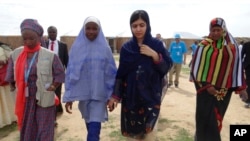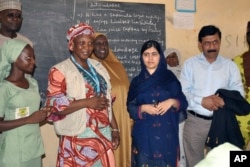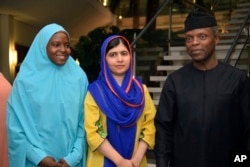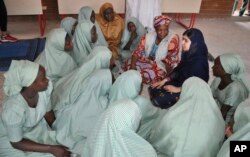Nobel Peace laureate Malala Yousafzai was greeted with cheers Tuesday by dozens of young women in northeastern Nigeria, where she spoke out for the many girls abducted under Boko Haram's deadly insurgency.
The Pakistani activist, 20, told The Associated Press she was excited by the courage of the young women who are undaunted as they pursue an education amid one of the world's worst humanitarian crises.
"This is part of my girl power trip, visiting many parts of the world," said Yousafzai, who also met with the freed Chibok schoolgirls taken in a mass abduction by Boko Haram more than three years ago. "I am here now because of the Nigerian girls, fighting for them and speaking up for them."
Yousafzai visited internally displaced camps in and around Maiduguri, where thousands have sheltered from Boko Haram's violence. The extremist group continues to carry out deadly attacks there, often using young female suicide bombers.
"They have lived in the period of extremism," Yousafzai said of the young women around her. Many have seen family members killed.
Shot by Taliban
Yousafzai was 15 when she shot in the head by Taliban militants in 2012, targeted because of her advocacy for women's education.
The Nobel winner said her Nigeria visit was significant because it was the partial fulfillment of what she advocated the last time she was there. In 2014, she pressed then-President Goodluck Jonathan to ensure the rescue of the more than 200 abducted Chibok schoolgirls.
On Monday, Yousafzai met with more than 100 who have since been rescued and now stay in the capital, Abuja, for what the government calls rehabilitation.
While she told the AP she shared their joy at being freed, she said she was not happy that the girls haven't been allowed to reunite fully with their families.
She said she hoped they would "live with their family, live a normal life."
Many others remain in Boko Haram captivity, "and the government must unite so that they should make sure that these girls are released," Yousafzai said.
"Boko Haram themselves should learn that in Islam, such things are unacceptable," she added. "This is against humanity, this is against Islam."
Yousafzai also met Monday with acting President Yemi Osinbajo, speaking up for the more than 10 million children displaced by Boko Haram and pressing for the declaration of a state of emergency for education in Nigeria.
She also urged the international community to address the crisis in the country's northeast.
Inspired by visitor
Girls at the internally displaced camps said the Nobel winner's story of courage gave them inspiration for a brighter future.
"Her story gives us hope. That's why we, too, want to go to school and become something in life," said Fatima Ali, 15. "We have to bear all pains like hunger to go to school. We barely eat once a day here. We have not eaten since morning because government people no longer bring us food for about two months now."
Three million children in Nigeria's northeast are in need of support to keep learning, according to the U.N. children's agency. Nearly 1,400 schools have been destroyed during Boko Haram's insurgency, which began in 2009, and more than 2,295 teachers have been killed, the agency says.
Ali said she was in school when Boko Haram attacked her town three years ago. "I want to become a soldier so that I could help my community to fight and kill Boko Haram, because they are not good people," she said.
Another student, Fatima Grema, 15, said she saw herself in Yousafzai.
"Boko Haram abducted me and wanted to marry me," she said. After being taken from the town of Baga to a location near the Cameroon border, "I later managed to escape," she said. "I was not in school until I came to the camp here."
Grema said she now wants to become a teacher.
UNICEF's country representative, Mohamed Malick Fall, said Yousafzai's visit was a symbol of hope, and "we will do everything in our power to make sure all children can keep learning."







